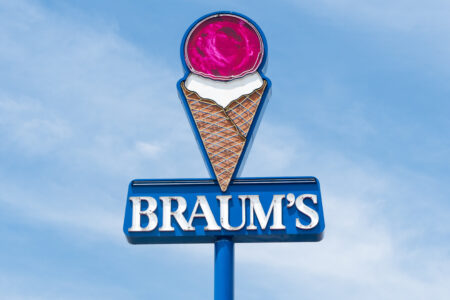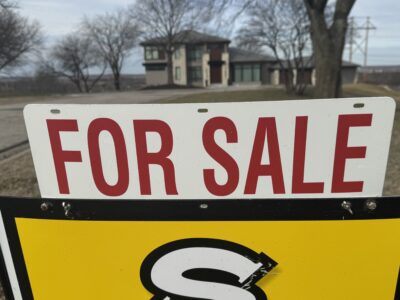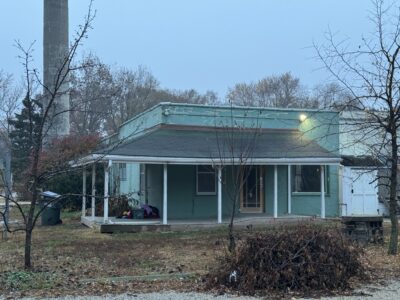
With 10-year tax abatement now expired, KU looking for new deal to make Rock Chalk Park tax exempt

photo by: Chance Parker
Kansas hosts Ohio State during the collegiate soccer season opener at Rock Chalk Park on Thursday, Aug. 18, 2022.
The 10-year anniversary of Rock Chalk Park comes with its own type of gift: a property tax bill of about half a million dollars.
Since its opening in 2014, the northwest Lawrence sports complex that houses a track, soccer pitch, softball field and other facilities for the University of Kansas has had a 10-year exemption from paying property taxes on its land and facilities.
Time, however, is up on that exemption, and a tax bill of about $495,000 has been prepared for the property. KU officials, though, are seeking a new way to get the property, which is near the northeast corner of Sixth Street and the South Lawrence Trafficway, permanently exempt from property taxes.
KU is seeking approval from the Kansas Board of Regents to take over ownership of the property from an entity that is controlled by the KU Endowment Association. If such an ownership change occurs, KU says that would make the project exempt from property taxes.
At this point, you may be wondering why KU — an entity of the state — would ever be paying property taxes on any of its facilities. The answer: Rock Chalk Park is a complicated venture.
Once upon a time, it also was a controversial one.
The sports park was a public-private partnership that involved at least four entities: KU, KU Endowment, the City of Lawrence and a for-profit private development group called Bliss Sports that was led by Lawrence developer Thomas Fritzel.
Fritzel, whose family is in the construction business, brokered the deal between the parties to build on the site a host of athletic facilities for KU and also a recreation center for the city. Fritzel said his company would build the facilities at a reduced rate in an act of philanthropy to KU and the city.
However, one condition of the gift was that KU wouldn’t immediately own the facilities. Instead, Bliss would lease the facilities to KU over many years. So, if you are keeping score at home, an entity controlled by KU Endowment owns the land upon which the track, soccer and softball stadiums sit, but the for-profit Bliss Sports corporation owns the actual stadiums.
It was that ownership structure that led officials in 2014 to determine that Rock Chalk Park likely would not qualify for the automatic property tax exemption that is given to normal land and buildings owned by KU. Instead, the City of Lawrence issued $40 million worth of industrial revenue bonds for the project. Those bonds come with a 10-year property tax exemption, under state law.
So, the expiration of the property tax exemption has not come as a surprise. The Journal-World back in 2014, and a few times since, had asked what would happen once the tax exemption expired, but there was never a clear answer.
Now, it appears the answer is a land transfer. The Kansas Board of Regents, which oversees KU and other public universities in the state, is being asked to approve a deal between KU and KU Endowment. The deal goes like this: RCP LLC — the KU Endowment-controlled entity that currently owns the Rock Chalk Park land — will donate the land to the KU Endowment Association. The KU Endowment Association then will donate the land to the university. The university — not Kansas Athletics Inc., to be clear — will then become the landlord for a ground lease with Bliss Sports. Currently, KU Endowment, for all practical purposes, is the landlord in that ground lease. That ground lease is what gives Bliss Sports the right to own the stadiums, which it in turn leases back to Kansas Athletics Inc.
Perhaps you are wondering how this land transfer exempts the entire project from property taxes, given that a private, for-profit entity still will own the stadiums. I’ve asked a KU official to also clarify the university’s position on that matter, but haven’t yet received a response. However, there are provisions in state law that say property is exempt from taxation if a government entity is leasing the property as part of an agreement to ultimately purchase it.
In this case, KU will own the stadiums at the end of the lease period, so that may be the answer. But that part of state law also says that any such property must be used “exclusively” by the governmental entity. That exclusivity clause was a point of discussion 10 years ago when the project was being developed. At that point, it was contemplated that Bliss Sports would have some rights to hold private, non-KU-affiliated events at the park.
For the most part, however, that hasn’t happened. The track and field stadium hosted the Junior Olympics several years ago, and a minor league soccer team affiliated with Sporting KC has used the soccer stadium on multiple occasions. But other such uses like concerts, car shows and other such events haven’t become a regular feature of the park.
If Regents approve this proposed deal, it is worth noting a couple of items that won’t change. None of this impacts Sports Pavilion Lawrence, which is the city-owned recreation center that also is located in Rock Chalk Park. The city owns the land and the building, and it already has a permanent tax exemption.
Importantly, based on the memo to the Regents, the lease deal between Kansas Athletics and Bliss Sports also will not change. Kansas Athletics under the new arrangement still will be required to make lease payments to Bliss Sports for a long time.
How long? Potentially until 2064. It is not until the facilities turn 50 years old that KU actually will own the stadiums. The Journal-World previously has reported that KU is obligated to pay for much of the maintenance of the facilities during the life of the lease. In 2018, KU was paying $2.2 million per year in lease payments. It is not clear whether that lease rate has changed, but Kansas Athletics’ most recent audited financial statements indicate there hasn’t been much change. Those financial statements show Kansas Athletics has a little more than $40 million in future operating lease payments to make between now and 2044. That’s in addition to the approximately $20 million Kansas Athletics has paid during the first 10 years of the lease.
The lease payments could extend to 2064, if Bliss Sports decides to execute an option to extend the lease another 20 years. Any lease payments for that extension would be over and above the approximately $60 million of lease payments made through 2044.
That lease agreement, in addition to the use of several no-bid contracts to build the stadiums and portions of the infrastructure at Rock Chalk Park, made the project controversial with members of the public. Several city commissioners either lost their re-election bids or chose not to run for reelection following the project, as members of the public expressed concern that the city and KU didn’t negotiate adequate terms in the public-private partnership.
Subsequently, the project’s lead private developer, Thomas Fritzel, was convicted on fraud charges related to a tax scheme involving a different public-private partnership he had with the City of Lawrence to build a hotel near the KU campus. Fritzel, who completed his federal prison sentence, continues to lead Bliss Sports, according to corporate records on file with the Kansas Secretary of State’s Office.







